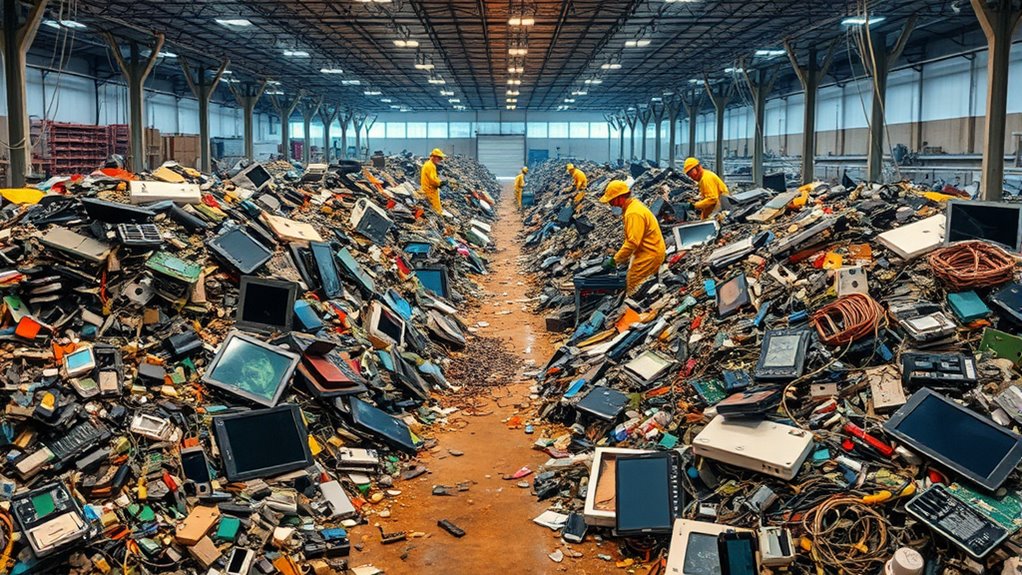To recycle electronics responsibly, look for certified e-waste recycling programs in your area. Many retailers and local governments offer drop-off points or collection events. If your devices still work, consider donating them after securely wiping any personal data. By making conscious choices and understanding harmful materials, you can help protect the environment and support a circular economy. Explore more ways to guarantee your e-waste disposal is safe and beneficial for the community.
Key Takeaways
- E-waste recycling prevents harmful materials from contaminating soil and water, protecting the environment and community health.
- Valuable materials like gold and copper can be recovered through recycling, reducing the need for mining and conserving resources.
- Look for certified e-waste recyclers through local government resources or online searches to ensure environmentally responsible disposal.
- Donating functional electronics extends their lifespan and benefits others, but always securely wipe data to protect your privacy.
- Support companies with sustainability initiatives and take-back programs to encourage eco-friendly practices in electronics consumption.

E-waste recycling is more important than ever as our reliance on technology grows. You probably have old smartphones, laptops, and other electronic devices cluttering your home. Instead of tossing them in the trash, consider the impact of e-waste on the environment and your community. E-waste contains harmful materials like lead, mercury, and cadmium, which can leach into the soil and water, posing serious health risks. By recycling your electronics responsibly, you’re not just clearing space; you’re also protecting the planet.
E-waste recycling is crucial for protecting our environment and community from harmful materials found in old electronics.
When you recycle your e-waste, you’re helping recover valuable materials such as gold, silver, and copper. These metals can be reused in new devices, reducing the need for mining and conserving natural resources. Instead of letting these materials go to waste, you can contribute to a circular economy where products are designed to be reused, repaired, or recycled. It’s a win-win situation for both you and the environment.
Finding a reliable e-waste recycling program in your area may seem intimidating, but it’s easier than you think. Many retailers and local governments offer drop-off programs or collection events. Just do a quick search online or check with your community’s waste management services. They often provide listings of certified e-waste recyclers who follow environmentally friendly practices. That way, you know your electronics will be handled responsibly.
You might also consider donating working devices to local charities or schools. Many organizations accept functioning computers, tablets, and smartphones, giving them a second life while helping those in need. Before donating, make sure to wipe your data securely. It’s essential to protect your personal information by using software designed for secure data deletion.
Don’t forget about your responsibilities as a consumer. When purchasing new electronics, look for companies that prioritize sustainability and offer take-back programs for their products. By choosing brands committed to environmental responsibility, you can make a positive difference every time you shop. Additionally, understanding the harmful materials in e-waste can help you make informed decisions about recycling and disposal.
E-waste recycling isn’t just a trend; it’s a necessary action we all must take. By recycling or donating your old electronics, you’re actively participating in a solution that benefits both the planet and your community. So next time you upgrade your tech, remember to think about what happens to your old devices. Make the conscious choice to recycle them responsibly, and you’ll be doing your part in creating a sustainable future for everyone.
Frequently Asked Questions
What Types of Electronics Can Be Recycled?
You can recycle a variety of electronics, including smartphones, laptops, tablets, desktop computers, televisions, and printers. Don’t forget about smaller devices like chargers, batteries, and gaming consoles. If it has a plug or runs on batteries, it’s likely recyclable. Just make sure to check with your local recycling program for specific guidelines, as some items may require special handling. Recycling these items helps reduce waste and conserves valuable resources.
Are There Any Fees for E-Waste Recycling?
Yes, there can be fees for e-waste recycling, but it often depends on where you go. Some facilities charge a nominal fee for certain items, especially larger electronics like TVs and refrigerators. However, many local programs offer free recycling days or drop-off locations to encourage responsible disposal. It’s a good idea to check with your local recycling center or waste management service for their specific policies and any potential costs involved.
How Can I Securely Erase My Data Before Recycling?
To securely erase your data before recycling, start by backing up any important files. Then, use software designed for data wiping, like DBAN or Eraser, which overwrites your data multiple times. For smartphones, do a factory reset and encrypt the device beforehand. finally, remove any SIM cards and memory cards. After you’ve erased everything, double-check that your data is gone, ensuring your personal information remains safe during the recycling process.
What Happens to Recycled Electronics?
Did you know that about 90% of the materials in recycled electronics can be reused? When you recycle your electronics, they’re disassembled and sorted. Valuable metals like gold, copper, and aluminum are extracted, while plastics and glass are processed for new products. This reduces landfill waste and conserves natural resources. So, when you recycle, you’re not just disposing of old tech; you’re contributing to a more sustainable future.
Are There Local E-Waste Recycling Events or Programs?
Yes, there are often local e-waste recycling events and programs in your area. You can check with your city’s waste management department or local environmental organizations for upcoming events. Many communities host special collection days to help you responsibly dispose of your old electronics. Additionally, some retailers offer recycling programs where you can drop off your devices. It’s a great way to guarantee your e-waste is handled properly and sustainably.
Conclusion
Just like a phoenix rising from the ashes, recycling your e-waste breathes new life into old electronics. By responsibly handing over your outdated gadgets, you’re not just getting rid of clutter; you’re planting seeds for a greener future. Each device you recycle transforms into something new, reducing pollution and conserving resources. So, let your small actions spark a big change—together, we can turn discarded tech into a lush garden of possibilities, thriving with potential.









